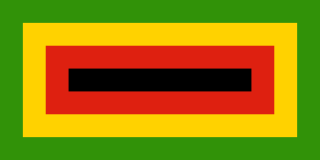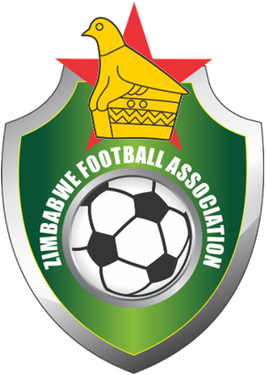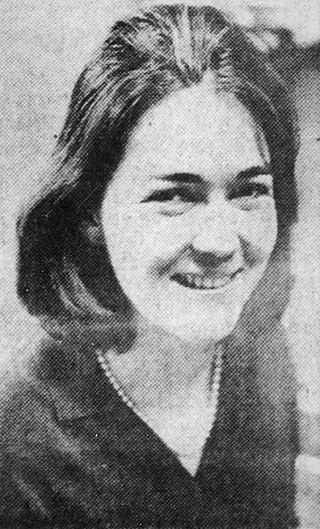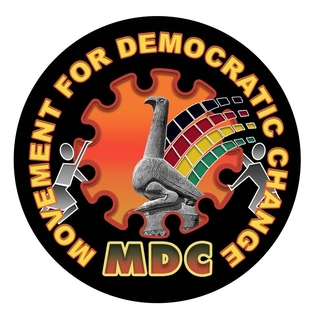Related Research Articles

Great Zimbabwe is a medieval city in the south-eastern hills of the modern country of Zimbabwe, near Lake Mutirikwe and the town of Masvingo. It is thought to have been the capital of a kingdom during the Late Iron Age. Construction on the city began in the 11th century and continued until it was abandoned in the 15th century. The edifices were erected by ancestors of the Shona people, currently located in Zimbabwe and nearby countries. The stone city spans an area of 7.22 square kilometres (2.79 sq mi) and could have housed up to 18,000 people at its peak, giving it a population density of approximately 2,500 inhabitants per square kilometre (6,500/sq mi). It is recognised as a World Heritage Site by UNESCO.
Land reform in Zimbabwe officially began in 1980 with the signing of the Lancaster House Agreement, as a program to redistribute farmland from white Zimbabweans to black Zimbabweans as an effort by the ZANU-PF government to give more control over the country's extensive farmlands to the black African majority. Before the implementation of these policies, the distribution of land in what was then known as Rhodesia saw a population of 4,400 white Rhodesians owning 51% of the country's land while 4.3 million black Rhodesians owned 42%, with the remainder being non-agricultural land. The discrepancy of this distribution, as well as the overall dominance of the white population in the newly-independent but largely unrecognized Rhodesian state was challenged by the black nationalist organizations ZANU and ZAPU in the Rhodesian Bush War. At the establishment of the modern Zimbabwean state in 1980 after the bush war, the Lancaster House Agreement held a clause that prohibited forced transfer of land, this resulted in changes in land distribution from the willing sale or transfer by owners being minor until 2000, when the government of Robert Mugabe began a more aggressive policy.

"Rise, O Voices of Rhodesia" was the national anthem of Rhodesia and Zimbabwe Rhodesia between 1974 and 1979. The tune was that of "Ode to Joy", the Fourth Movement from Ludwig van Beethoven's Ninth Symphony, which had been adopted as the official European continental anthem by the Council of Europe in 1972. The music used in Rhodesia was an original sixteen-bar arrangement by Captain Ken MacDonald, the bandmaster of the Rhodesian African Rifles. A national competition was organised by the government to find an appropriate set of lyrics to match the chosen tune, and won by Mary Bloom of Gwelo.

The Zimbabwe African National Union – Patriotic Front (ZANU–PF) is a political organisation which has been the ruling party of Zimbabwe since independence in 1980. The party was led for many years by Robert Mugabe, first as prime minister with the Zimbabwe African National Union (ZANU) and then as president from 1987 after the merger with the Zimbabwe African People's Union (ZAPU) and retaining the name ZANU–PF, until 2017, when he was removed as leader.

Tsitsi Dangarembga is a Zimbabwean novelist, playwright and filmmaker. Her debut novel, Nervous Conditions (1988), which was the first to be published in English by a Black woman from Zimbabwe, was named by the BBC in 2018 as one of the top 100 books that have shaped the world. She has won other literary honours, including the Commonwealth Writers' Prize and the PEN Pinter Prize. In 2020, her novel This Mournable Body was shortlisted for the Booker Prize. In 2022, Dangarembga was convicted in a Zimbabwe court of inciting public violence, by displaying, on a public road, a placard asking for reform.
The Zambia national football team represents Zambia in association football and is governed by the Football Association of Zambia (FAZ). During the 1980s, they were known as the KK 11, after founding president Dr. Kenneth Kaunda ("KK") who ruled Zambia from 1964 to 1991. After the country adopted multiparty politics, the side was nicknamed Chipolopolo which means the "Copper Bullets". The team won an Africa Cup of Nations title in 2012. This team has also become the most successful team in the COSAFA Cup, surpassing Zimbabwe after winning the 2023 edition.

The Zimbabwe national football team represents Zimbabwe in men's international football and is controlled by the Zimbabwe Football Association (ZIFA), formerly known as the Football Association of Rhodesia. The team has never qualified for the FIFA World Cup finals, but has qualified for the Africa Cup of Nations five times. Zimbabwe has also won the COSAFA Cup a record six times. The team represents both FIFA and Confederation of African Football (CAF).
White Zimbabweans are Zimbabwean people of European descent. In linguistic, cultural, and historical terms, these Zimbabweans of European ethnic origin are mostly English-speaking descendants of British settlers. A small minority are either Afrikaans-speaking descendants of Afrikaners from South Africa or those descended from Greek, Portuguese, Italian, and Jewish immigrants.

The Zimbabwe National Army (ZNA) is the primary branch of the Zimbabwe Defence Forces responsible for land-oriented military operations. It is the largest service branch under the Zimbabwean Joint Operations Command (JOC). The modern army has its roots in the Rhodesian Army, which was raised between 1963 and 1964 after the breakup of the Federation of Rhodesia and Nyasaland. A Joint High Command created in March 1980 to oversee integration of the formerly belligerent Rhodesian Security Forces, Zimbabwe African National Liberation Army (ZANLA), and the Zimbabwe People's Revolutionary Army (ZIPRA) officially established the Zimbabwe National Army in late 1980, nearly a year after the end of the Rhodesian Bush War.

Stella Chiweshe was a Zimbabwean musician. She was known internationally for her singing and playing of the mbira dzavadzimu, a traditional instrument of the Shona people of Zimbabwe. She was one of few female players, and learned to play from 1966 to 1969, when other women did not.
Zimbabweans Britons are British people who were born in Zimbabwe or can trace their ancestry to immigrants from Zimbabwe who emigrated to the United Kingdom. While the first natives of the country then known as Southern Rhodesia arrived in Britain in larger numbers from the late-1960s, the majority of immigrants arrived during the 1990s and 2000s. The Zimbabwean community in the UK is extremely diverse, consisting of individuals of differing racial, ethnic, class, and political groups. There are a diverse mix of asylum seekers, professionals, investors, businesspeople, labour migrants, students, graduates, undocumented migrants, and others who have gained British citizenship.

Judith Todd is the second daughter of Garfield Todd (1908–2002), Rhodesian Prime Minister 1953-58, and a political activist regarding Zimbabwe. She was married to Richard Acton from 1974 to 1984. Todd was born at Dadaya Mission in Rhodesia. She was educated at Queen Elizabeth Girls School. Her missionary father, Reginald Stephen Garfield Todd, served as Prime Minister of Southern Rhodesia between 1953 and 1958. Her mother, Jean Grace Wilson Todd, designed and implemented the Southern Rhodesian African Educational System.

The Zimbabwean diaspora refers to the diaspora of immigrants from the nation of Zimbabwe and their descendants who now reside in other countries. The number of Zimbabweans living outside Zimbabwe varies significantly from 4 to 7 million people, though it is generally accepted at over 5 million people, some 30 per cent of all Zimbabweans. Varying degrees of assimilation and a high degree of interethnic marriages in the Zimbabwean diaspora communities makes determining exact figures difficult. The diaspora population is extremely diverse and consists of Shona people, Ndebele, white Zimbabweans, mixed-race people, Asians, Jewish people and other minority groups. The diaspora traces their origin to several waves of emigration, starting with the exodus that followed the 1965, unilateral declaration of independence in Rhodesia, but significantly since the sociopolitical crisis that began in 2000.

The Movement for Democratic Change – Tsvangirai (MDC–T) is a centre-left political party and was the main opposition party in the House of Assembly of Zimbabwe ahead of the 2018 elections. After the split of the original Movement for Democratic Change in 2005, the MDC–T remained the major opposition faction, while a smaller faction, the Movement for Democratic Change – Ncube, or MDC–N, was led by Welshman Ncube.

The Movement for Democratic Change – Ncube (MDC–N) was a Zimbabwean political party led by politician and attorney Welshman Ncube. It was founded in 2005 when the Movement for Democratic Change split apart and in the 2008 general election, it was known as the Movement for Democratic Change – Mutambara (MDC–M) in contrast to the larger Movement for Democratic Change – Tsvangirai (MDC–T). The MDC–N and the MDC–T operated as separate opposition parties until their re-unification in 2018. The re-united party now operates under the original name, the MDC.

Beatrice Mtetwa is a Swazi was born 1957 and naturalised Zimbabwean lawyer who has been internationally recognized for her defense of journalists and press freedom. The New York Times described her in 2008 as "Zimbabwe's top human rights lawyer".

Zimbabwe competed at the 2012 Summer Olympics in London, UK from 27 July to 12 August 2012. This was the nation's ninth consecutive appearance at the Olympics, after gaining its independence from the former Rhodesia.

Jenni Williams is a Zimbabwean human rights activist and a founder of Women of Zimbabwe Arise (WOZA). A prominent critic of President Robert Mugabe's government, she was described by The Guardian in 2009 as "one of the most troublesome thorns in Mugabe's side".
Joseph Luke Culverwell (1918–1993) was a South African-born Zimbabwean politician and psychologist. Between 1981 and January, 1988, Culverwell was the Deputy Minister of Education and Culture of the Republic of Zimbabwe. In January 1988, he was appointed to the Minister of State in the President’s Office responsible for National Scholarships until 1992 when, for a brief period, he became the Deputy Minister of Higher Education.
Tsitsi Veronica Muzenda is a Zimbabwean politician, senator of Midlands Province and daughter of the former Vice-President of Zimbabwe, Simon Muzenda.
References
- ↑ Smith, David (June 6, 2012). "Her Zimbabwe: portal of a nation". The Guardian . ISSN 0261-3077.
- ↑ Davidson, Brett (June 23, 2012). "Her Zimbabwe". Africa Is a Country. Retrieved June 25, 2023.